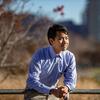World wide web
For Aziz, who has been diagnosed with autism spectrum disorder (ASD), living abroad for an entire semester was a meaningful milestone. It wasn’t clear when he first applied to Temple if he would live on campus or would need to commute from his childhood home in West Chester, Pennsylvania. So, managing all of the logistics of studying abroad in Japan was a big step for him.
“I did not feel lost there and I was able to just dive into the culture,” Aziz said. “Temple provided me with a lot of adventures, and 2018 was just the best year of my life.”
A social network
While at Temple, Aziz studied neuroscience, learning about connections in the human brain. All the while, he made important connections of his own. He got involved with student groups that had a particularly strong impact on him: Social Xchanges, a group for students with social and communication challenges, with which he remains involved; the Asian Student Association and an Asian-Interest Fraternity, Delta Chi Psi Fraternity Inc., among others.
These experiences were new for Aziz, who hadn’t yet found communities based around these identities.
“My high school didn’t have autism support or Asian student groups, or even awareness of those groups,” he remembered. “I’m glad I chose Temple because it represents people of different backgrounds, both in terms of ethnicity and neurodiversity.”



